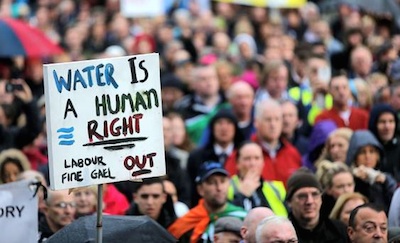
The largest political movement seen in Ireland in a generation looks set to grow further after a giant protest in Dublin on Wednesday.
The hopes of the the coalition government that their concessions on water charges would take the momentum out of the protests were confounded when an estimated 100,000 travelled from all parts of Ireland in difficult weather to demand they be scrapped entirely. Further actions are now being planned against the implementation of water charges, with mass protests set for January 31 and a national strike being mooted if the government does not abandon the plan.
Despite freezing cold, spirits were high in Dublin on Wednesday as people heard speeches from political, community and union speakers. Musicians, singers, activists and politicians entertained and addressed the rally from a main stage amid a festival atmosphere.
Oscar winning singer-songwriter Glen Hansard was among those who turned out.
“I think there’s something happening in the world, and I feel this is our version of it,” he said.
“The water charge is the straw that’s breaking our backs - people are essentially very dissatisfied with how we are being governed.
“I’m not political, but the Irish nation has now been forced to be (political) and to come out on the streets.”
Many of those present said they were being impoverished by a multiplicity of charges and taxes while housing and living costs have escalated.
Protesters held up red cards and called for the coalition Fine Gael/Labour government to be ousted.
Hundreds of Gardai and riot police deployed for the occasion were accused of attempting to provoke trouble. Some were filmed assaulting protestors at a city centre demonstration late on Wednesday evening.
Sinn Fein leader Gerry Adams described the turnout at the rally as “real democracy”. “Nobody ever gave anybody rights, you have to take your rights,” he told the crowds. “Stay on the streets until the government become the servants of the people.”
Socialist TD Clare Daly said the rally would replace fear with hope. “This is indeed what democracy looks like,” she said. “We are living in a moment that changed Ireland.”
A resort to “heavy gang” tactics against the water protests appeared to be confirmed when peaceful campaigners were threatened in Stoneybatter on Thursday.
One local resident, Mick Mooney, was on his way to work when he was pinned against a wall by three private security guards and told ‘I’ll get you. You don’t know who you’re messing with.’
They then showed him a photo of his car and its number plate.
In Grangegorman, a car belonging to a peaceful campaigner had its tyres slashed.
“Intimidation, fear, bullying and violence seem to be the only solution Irish Water can propose to local residents’ peaceful protests,” campaigners said.
“If they get away with this violence in Stoneybatter, it will spread to other communities. This is not just an attack on the Dublin 7 campaign, this is an attack on us all.”
Organisers are now planning massive local protests in every area on January 31st, the new deadline for registering for the charges.
There have also been calls for a national strike in a bid to further escalate the campaign.
Micheal MacLochlainn of the IRSP said: “We know that grass roots elements within some major Unions backing Right2Water are already discussing a general strike as a possibility and I urge them to make their voices heard within their Unions.”
However, the government still shows no sign of listening to the people.
Minister for Health Leo Varadkar said “It really bothers me that people are protesting about 3 euro a week.”
Environment minister Alan Kelly claimed the protest would make no difference to the government’s latest austerity levy. “I don’t envisage anything changing,” he said. “This is completely necessary.”
MANDATE 'LOST'
Inside Leinster House, even as the barricades were being erected to keep the public away, the government held a motion of confidence in itself. But signs of confidence were few, with the Taoiseach backing away from a plan to hold a general election in 2015.
“I have no intention of creating any instability by calling a general election in 2015,” he said, speaking at the opening of the three-hour debate on the confidence motion.
“And my preference for government, after the next election in 2016, is for the continuation of the Coalition that has restored our economic sovereignty, that is the Fine Gael and Labour parties.”
Tanaiste Joan Burton criticised protestors as “naysayers”.
“We had plenty of vigorous debate in advance of the budget but, in the end, agreed a package that met our mutual objectives as laid down in the statement of Government priorities.”
Sinn Fein Leader Gerry Adams said the government “knows full well” that it has lost its mandate to govern. He said the overriding theme of the government was its pursuit of a deeply unfair economic policy.
Statistical reports have shown that October’s budget favoured high earners, while unemployed people have suffered most consistently under the current government.
“You have imposed brutal and destructive austerity measures on struggling families and vulnerable citizens,” he said.
“This Government’s Budgets have been among the most regressive this State has ever seen. Budget 2015 is the fourth regressive budget in a row. It widened the rich-poor gap and deepened inequality.
“For God’s sake what is the point of Labour in Government if they don’t uphold equality?”
He said the Taoiseach and the Tanaiste would not answer the straightforward questions being put to them.
“Every time the Taoiseach and the Tanaiste evade questions and duck and dodge their responsibilities, they merely expose this Government’s arrogance and incompetence.”
He said the Taoiseach had characterised the coming General Election as a choice between a Fine Gael led Government or one led by Sinn Fein, adding: “You should have the courage of your convictions. You should allow citizens to make the choice.”
![[Irish Republican News]](https://republican-news.org/graphics/title_gifs/rn.gif)
![[Irish Republican News]](https://republican-news.org/graphics/title_gifs/harp.gif)

